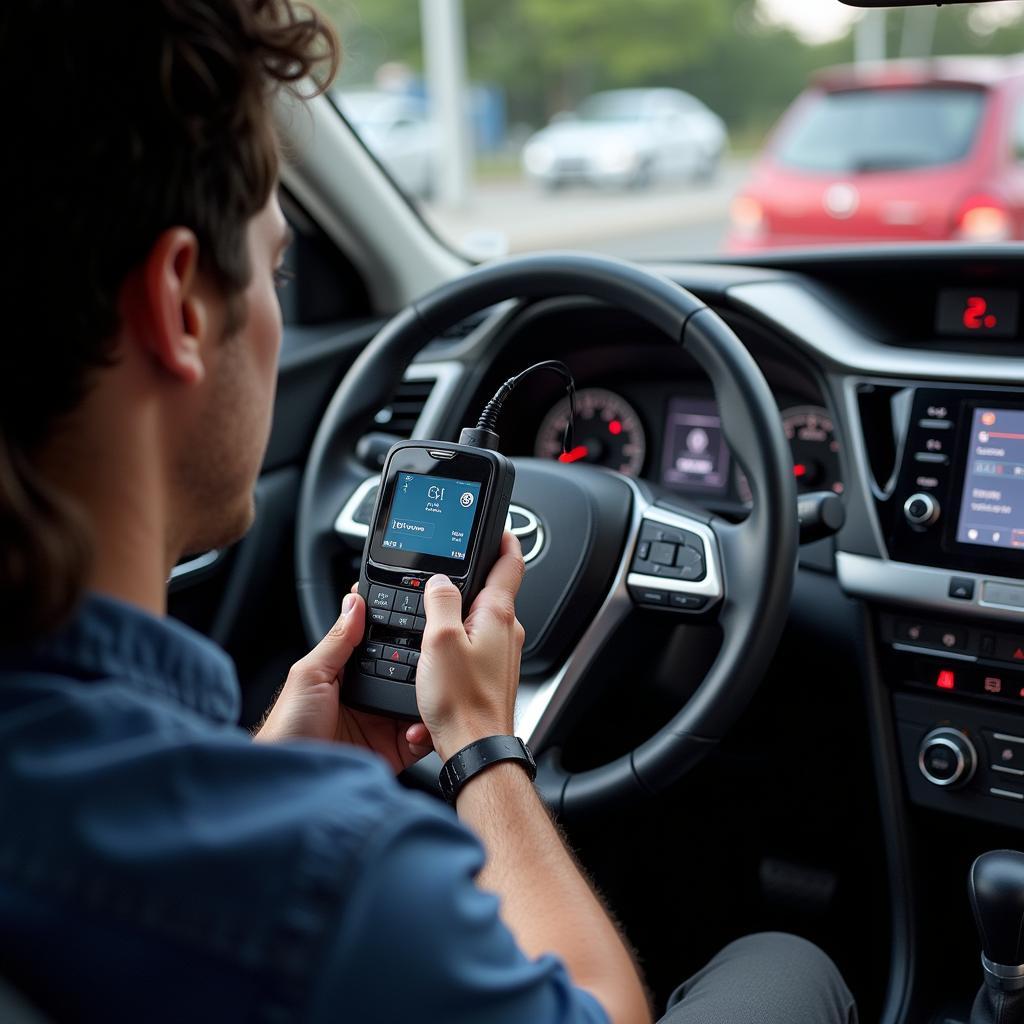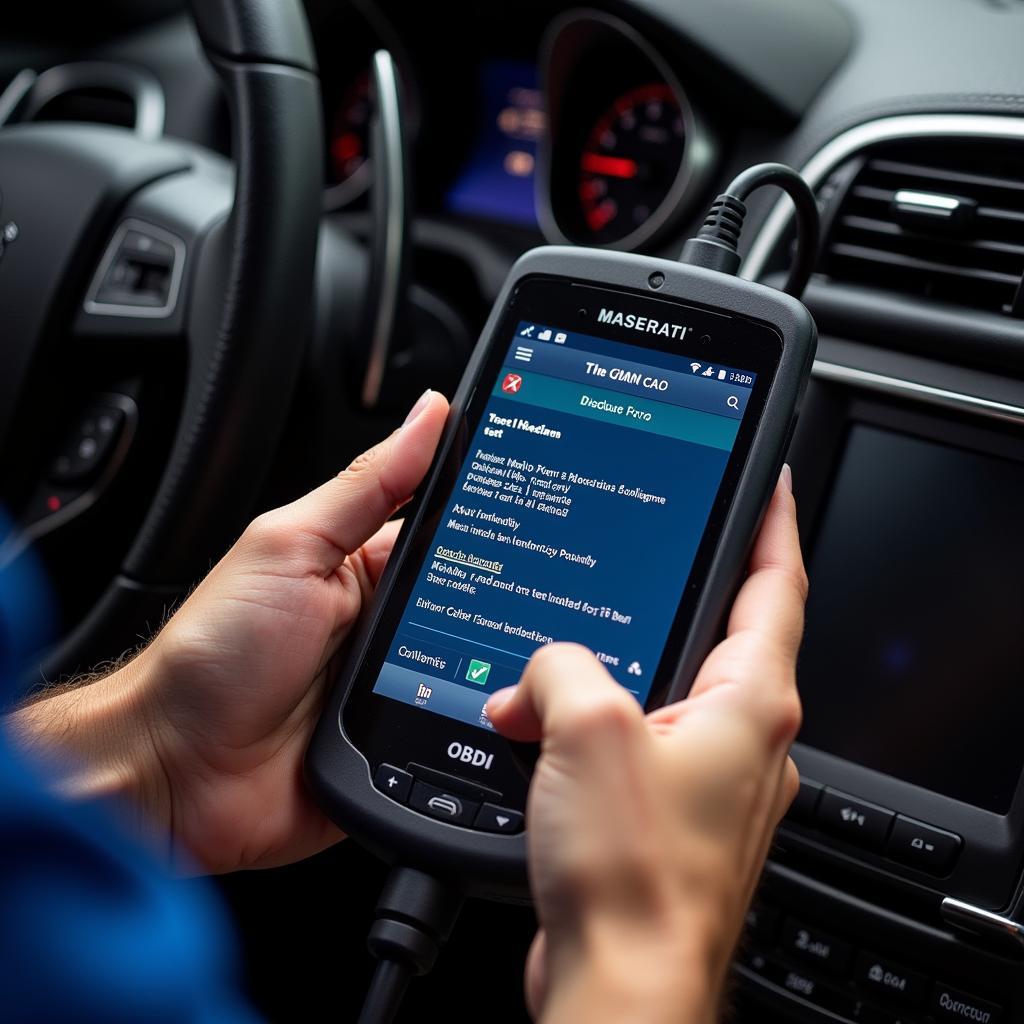A Chrysler Voyager Diagnostic Tool is essential for quickly and accurately diagnosing car problems. Whether you’re a seasoned mechanic or a Voyager enthusiast looking to take DIY repairs to the next level, understanding and utilizing these tools can save you time, money, and frustration. This comprehensive guide will delve into the world of Chrysler Voyager diagnostic tools, exploring their functionalities, benefits, and how to choose the right one for your needs.
Why You Need a Chrysler Voyager Diagnostic Tool
Modern vehicles like the Chrysler Voyager are equipped with sophisticated onboard computer systems, often referred to as Electronic Control Units (ECUs). These ECUs monitor and control various aspects of your vehicle’s operation, from engine performance and transmission shifting to airbag deployment and anti-lock braking systems.
When a problem arises, the ECU stores a Diagnostic Trouble Code (DTC) corresponding to the specific fault. A Chrysler Voyager diagnostic tool acts as the bridge between you and your vehicle’s computer, allowing you to:
- Retrieve and interpret DTCs: Decipher cryptic codes and understand the root cause of your vehicle’s issue.
- Reset Check Engine Light: After addressing the underlying problem, clear the DTC and turn off the check engine light.
- Access live data streams: Monitor real-time sensor readings for various systems, aiding in pinpoint diagnosis.
- Perform advanced functions: Depending on the tool, you may be able to perform tasks like actuator tests, key programming, and module calibrations.
[image-1|chrysler-voyager-diagnostic-port|Chrysler Voyager Diagnostic Port|A close-up image showcasing the location of the Chrysler Voyager’s OBD-II diagnostic port. The image highlights the port’s 16-pin trapezoidal shape, usually located under the driver’s side dashboard.]
Types of Chrysler Voyager Diagnostic Tools
Navigating the market of diagnostic tools can be overwhelming, with various options catering to different needs and budgets. Generally, they fall into these categories:
1. Basic Code Readers
These entry-level tools are budget-friendly and primarily focus on retrieving and clearing DTCs. They are a great starting point for DIYers who want to understand the basic reasons behind their check engine light.
Pros:
- Affordable
- Easy to use
- Sufficient for basic diagnostics
Cons:
- Limited functionality
- May not access all DTCs
- No live data or advanced features
2. OBD-II Scanners
A step up from basic code readers, OBD-II scanners offer a wider range of features, including:
- Reading and clearing DTCs from all systems
- Displaying live data streams
- Viewing freeze frame data (snapshot of vehicle parameters at the time a DTC was set)
- Some models offer additional functionalities like ABS and airbag system diagnostics.
Pros:
- More comprehensive diagnostics
- Access to live data
- Often includes manufacturer-specific codes
Cons:
- More expensive than basic code readers
- Limited advanced functionalities
3. Professional-Grade Scan Tools
These high-end tools are designed for professional mechanics and serious DIY enthusiasts. They offer the most comprehensive diagnostic capabilities, including:
- Access to all vehicle systems
- Advanced coding and programming functions
- Bi-directional control for actuator tests
- ECU flashing and reprogramming
- Technical support and regular software updates
Pros:
- Unparalleled diagnostic depth
- Wide range of advanced features
- Future-proof investment
Cons:
- Significantly more expensive
- Requires technical knowledge for optimal use
[image-2|professional-grade-scan-tool|Professional-Grade Scan Tool in Use|An image of a mechanic using a professional-grade scan tool on a Chrysler Voyager. The image highlights the tool’s large screen displaying diagnostic data, specialized connectors, and user-friendly interface.]
Choosing the Right Chrysler Voyager Diagnostic Tool
Selecting the appropriate tool depends on your individual needs, budget, and technical expertise. Consider these factors:
- Frequency of use: Occasional DIY repairs might only require a basic code reader, while frequent or professional use justifies a more advanced tool.
- Desired functionality: Determine the specific features you need, such as live data, bi-directional control, or programming capabilities.
- Budget: Set a realistic budget, remembering that investing in a higher-quality tool often pays off in the long run.
- User experience: Opt for a tool with an intuitive interface, clear instructions, and reliable customer support.
Expert Insights
“Investing in a quality diagnostic tool is crucial for efficient Chrysler Voyager repairs,” says John Miller, a certified automotive technician with over 20 years of experience. “It allows you to pinpoint problems quickly, avoiding unnecessary guesswork and part replacements.”
Conclusion
A Chrysler Voyager diagnostic tool is an indispensable asset for anyone looking to take charge of their vehicle’s maintenance and repairs. By understanding the different types of tools, their capabilities, and your specific needs, you can choose the right one to empower you with knowledge and control over your Chrysler Voyager’s health.
Need help selecting the perfect Chrysler Voyager diagnostic tool? Contact the experts at ScanToolUS today! We offer a wide range of tools for all budgets and skill levels. Our team is dedicated to providing you with the right tools and support to keep your Voyager running smoothly.
ScanToolUS Contact Information:
Phone: +1 (641) 206-8880
Office: 1615 S Laramie Ave, Cicero, IL 60804, USA
FAQs
1. Are Chrysler Voyager diagnostic tools compatible with other car brands?
Some tools offer multi-vehicle compatibility, while others are brand-specific. Check the tool’s specifications to ensure it supports your Chrysler Voyager.
2. Can I use a diagnostic tool to program a new key for my Voyager?
Some professional-grade tools offer key programming functionality. However, this often requires specialized knowledge and may not be available for all models.
3. How often should I use a diagnostic tool on my Chrysler Voyager?
It’s recommended to perform a diagnostic scan periodically, even when no warning lights are illuminated, to catch potential issues early on.
4. What is the difference between OBD-II and manufacturer-specific codes?
OBD-II codes are standardized across most vehicles, while manufacturer-specific codes provide more detailed information related to your Chrysler Voyager’s systems.
5. Where can I find a reliable source for Chrysler Voyager diagnostic tool software updates?
Reputable tool manufacturers usually offer software updates and technical support through their websites.




Pingback: Mastering Modern Mechanics: Your Guide to Electronic Diagnostic Tools - Car Scan Tool